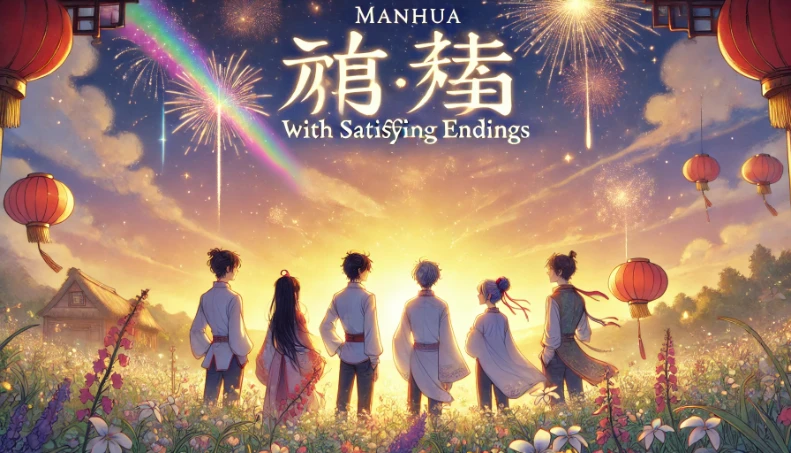Manhua with a satisfying ending, a phrase that resonates deeply with readers who crave closure and a sense of fulfillment. The journey of a manhua, with its captivating storylines and intricate characters, often culminates in an ending that can leave a lasting impression.
What makes an ending truly satisfying, though, is a complex question with no single answer. This exploration delves into the multifaceted nature of satisfying endings in manhua, examining the elements contributing to a sense of completion and emotional resonance.
We’ll delve into the diverse interpretations of what constitutes a satisfying ending, considering how genre conventions shape reader expectations. We’ll explore common themes and plot points that contribute to a sense of closure, and analyze the role of character development and resolution in achieving a satisfying conclusion.
Through examples of popular manhua, we’ll illustrate how these elements come together to create endings that leave a lasting impact on readers.
Defining “Satisfying” Endings
A satisfying ending in a manhua, or any story, is a subjective experience. What one reader finds fulfilling, another might consider underwhelming. However, certain common threads weave through interpretations of a satisfying ending, particularly within the context of manhua.
The genre conventions of a manhua significantly influence expectations for its ending. For example, a romantic comedy, will likely conclude with a happy ending that features the main couple together. In contrast, a fantasy manhua might focus on the hero’s journey, ending with a sense of accomplishment or a new beginning.
Interpretations of Satisfying Endings
The interpretation of a satisfying ending in manhua can vary based on the individual reader’s preferences and the specific genre. Here are some common interpretations:
- Closure and Resolution: A satisfying ending provides a sense of closure for the plot and characters. All loose ends are tied up, unanswered questions are addressed, and the main conflict is resolved.
- Character Development: Readers often find endings satisfying when characters undergo meaningful growth and transformation throughout the story. Their journey culminates in a positive change, either in their personality, skills, or relationships.
- Emotional Impact: A satisfying ending evokes strong emotions in the reader, whether it’s joy, sadness, or a sense of fulfillment. The story leaves a lasting impression and sparks reflection on the themes explored.
- Hope and Optimism: Many readers find endings satisfying when offering hope for the future. This could involve the characters achieving their goals, overcoming obstacles, or simply finding happiness and peace.
Genre Conventions and Endings
Genre conventions play a significant role in shaping reader expectations for endings. For instance:
- Romantic Comedy: These manhua typically conclude with a happy ending, featuring the main couple together.
- Fantasy: These manhua often end with the hero’s journey culminating in a sense of accomplishment or a new beginning.
- Xuanhuan: These manhua often focus on the protagonist’s cultivation journey, ending with their ascension to a higher level of power or achieving their ultimate goal.
- Wuxia: These manhua often end with the protagonist’s journey of revenge, redemption, or achieving a sense of justice.
Examples of Satisfying Endings
Many manhua endings are widely considered satisfying, leaving a lasting impact on readers. Some examples include:
- “The Untamed”: This xianxia manhua, based on the novel “Mo Dao Zu Shi,” ends with the protagonist, Wei Wuxian, achieving his goal of reviving his cultivation path and protecting his loved ones. The ending is considered satisfying because it provides closure for the main conflict, features significant character development for Wei Wuxian and his companions, and evokes a sense of hope for the future.A satisfying ending can elevate a manhua to a whole new level, leaving readers feeling fulfilled and content. Sometimes, the voice acting can also contribute to this sense of satisfaction, bringing the characters and their emotions to life.
These well-crafted audio productions can enhance the overall experience, making the journey to a satisfying ending even more rewarding.
- “The King’s Avatar”: This esports manhua concludes with the protagonist, Ye Xiu, achieving his dream of winning the championship with his new team. The ending is satisfying because it showcases Ye Xiu’s perseverance, his unwavering passion for the game, and the power of teamwork.
- “Grandmaster of Demonic Cultivation”: This xianxia manhua, adapted from the novel “Mo Dao Zu Shi,” ends with the protagonist, Wei Wuxian, sacrificing himself to protect his loved ones. The ending is considered satisfying because it highlights the themes of sacrifice, redemption, and the enduring power of love.
Common Elements of Satisfying Endings

A satisfying ending in a manhua, like any good story, leaves the reader feeling fulfilled and emotionally connected to the characters and their journeys. While there’s no single formula for achieving this, certain recurring themes and plot points contribute significantly to a sense of closure and contentment.
Character Development and Resolution
Character development is a crucial aspect of any satisfying ending. Readers invest emotionally in characters, and seeing them evolve and overcome challenges creates a sense of fulfillment. A satisfying ending often showcases how characters have learned from their experiences, grown as individuals, and achieved a sense of peace or resolution.
“Character development is the key to a satisfying ending. When we see characters evolve and learn from their experiences, it creates a sense of closure and emotional connection.”
- Growth and Change: A satisfying ending demonstrates how characters have grown and changed throughout the story. This might involve overcoming past traumas, learning new skills, or accepting responsibility for their actions.
- Redemption and Forgiveness: Characters who have made mistakes or committed wrongdoings often find redemption through acts of selflessness, sacrifice, or genuine remorse.Seeing them forgiven or finding forgiveness within themselves can create a powerful sense of closure.
- Resolution of Conflicts: Satisfying endings often resolve major conflicts, leaving no loose ends or unanswered questions. This doesn’t necessarily mean a happy-ever-after, but it should provide a sense of closure and a clear understanding of the characters’ fates.
Themes and Motifs
Recurring themes and motifs can enhance the emotional impact of a satisfying ending. They provide a sense of continuity and reinforce the story’s central message.
- Justice and Fairness: Many satisfying endings involve themes of justice and fairness, where wrongs are righted, and the guilty are held accountable. This can be seen in stories where corrupt officials are brought down, or victims of injustice finally find vindication.
- Love and Sacrifice: Themes of love and sacrifice are often intertwined in satisfying endings. Characters may make difficult choices, even sacrificing their own happiness for the well-being of others.
- Hope and Optimism: Even in stories with tragic elements, a satisfying ending often leaves the reader with hope and optimism.This might be achieved through the characters’ resilience, the promise of a brighter future, or the belief that light can still prevail even in darkness.
Examples from Manhua with a good, satisfying ending
- “The King’s Avatar”: This manhua follows the journey of a professional gamer who returns to the virtual world he once dominated. The ending features the protagonist achieving his goals and fulfilling his passion. It showcases character development, the resolution of conflicts, and a sense of closure that satisfies the reader.
- “The Scum Villain’s Self-Saving System”: This manhua features a character who is reborn into a novel as a villain. The ending shows the protagonist overcoming his destiny, achieving redemption, and finding love. The ending is satisfying due to the character’s growth, the resolution of conflicts, and the sense of hope it leaves with the reader.
Final Thoughts: Manhua With A Good Ending That Is Satisfying

The quest for a satisfying ending in manhua is ultimately a journey of personal interpretation. While common elements contribute to a sense of closure, the true measure of satisfaction lies in the individual reader’s experience. Whether it’s a triumphant resolution, a bittersweet farewell, or a poignant reflection on the complexities of life, a truly satisfying ending leaves a lasting mark on the reader’s imagination, reminding them of the power of storytelling to connect, inspire, and resonate deeply.
Essential Questionnaire
What are some popular examples of manhua with satisfying endings?
Some popular examples include “The King’s Avatar,” “The Scum Villain’s Self-Saving System,” and “Mo Dao Zu Shi.” These manhua are known for their well-developed characters, compelling storylines, and satisfying conclusions that leave a lasting impression on readers.
What makes an ending bittersweet?
A bittersweet ending often involves a sense of loss or sacrifice, but it also acknowledges the beauty and value of the journey. It can leave readers with a mixture of emotions but ultimately provides a sense of closure and understanding.


Leave a Reply